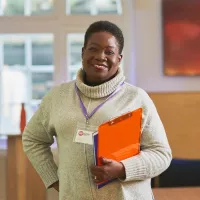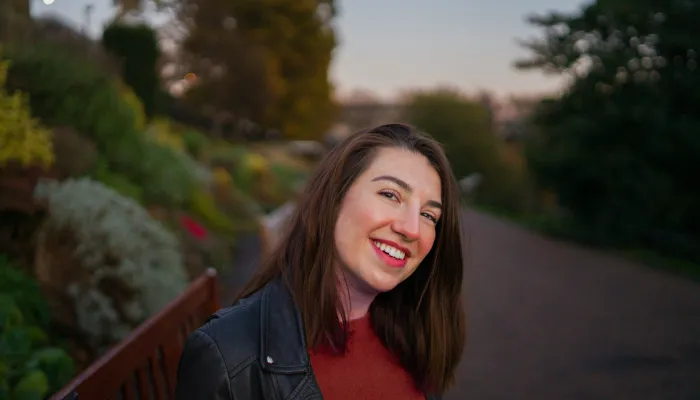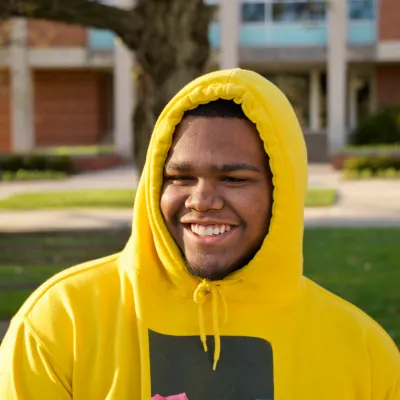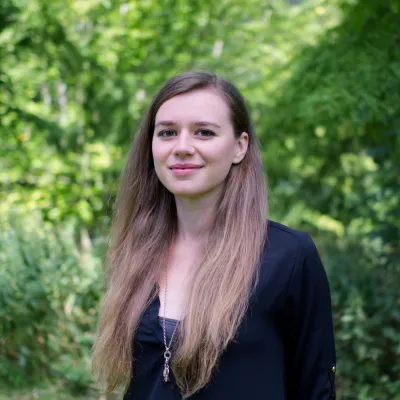Dee* was supported over a number of weeks by the Centrepoint Helpline who advocated on her behalf. A few months later, Dee is living in temporary accommodation in a studio flat, has been assessed as priority need and can start bidding on properties. This means that she is able to start “rebuilding her life.”
Reaching out to the helpline
For two long years, Dee, 25, had been sofa surfing, fleeing domestic violence from a family member who still harassed her. Her housing case with the local authority seemed to be going nowhere, and she felt as if she was fighting an uphill battle.
“I reached out to the Centrepoint Helpline when I was at an all-time low,” Dee recalled. “I felt lost, my morale was shattered, and I was desperate for help. I’d read stories on the website of others who had been helped and it felt relatable so I gave them a call.”
Dee's mental health challenges—anxiety, depression, obsessive-compulsive disorder (OCD), and severe attention deficit hyperactivity disorder (ADHD)—combined with her physical health issues, including severe Crohn’s disease, Reynaud’s disease, endometriosis, and dermatitis, made her situation even more daunting. The instability of her housing was exacerbating her distress.
Hannah, one of Centrepoint’s Helpline Advisors took Dee’s call. “It’s my job to help young people like Dee navigate this challenging process,” Hannah said. “It was clear when I talked to her that she was in distress and needed an advocate.”
Having an advocate
Hannah contacted the Housing Options team on Dee’s behalf to enquire about her case. The response was not what they had hoped - the housing officer was still investigating whether Dee was deemed ‘homeless’ and had therefore not yet triggered the necessary interim accommodation process under Section 188 of the Housing Act. They were still trying to assess whether she was in priority need for housing.
After that, days passed with little contact from her housing officer, leaving Dee feeling increasingly frustrated, but Hannah continued to advocate on her behalf. “I followed up with Dee’s housing officer,” Hannah explains. “I wanted to ensure Dee got the help she needed. She continued to rely on the Out of Hours service for housing support. However, the shared toilet facilities and lack of private space further exacerbated and amplified the symptoms of her condition.” As Dee further explains, “The conditions in the Out of Hours service and the way I was talked to by the staff there made me feel suicidal. I felt like I was trying to eat soup with a fork.”
As her distress grew, so did the weight of her financial situation. Living on just £115 a week from sick pay left Dee struggling to eat. Hannah stepped in again, applying for an emergency food voucher that brought a glimmer of relief. “That support made a huge difference,” Dee explains “I felt so grateful.”
Dee faced further setbacks at the council office, where she encountered rude staff who told her she was not a priority. “They even said I couldn’t charge my phone there!” she exclaimed, shaking her head. “I felt like I was being pushed away.”
A glimmer of hope
However, Hannah assured Dee that they would keep pursuing her case. “She continued to liaise with the Out of Hours service and Dee’s housing officer.
Eventually, hope began to emerge. The Housing Options team contacted Dee to inform her that they had agreed to provide temporary accommodation. “It felt like a huge weight had been lifted and started to feel much more supported by my housing officer.” Dee said.
Hannah guided Dee through the necessary paperwork, understanding that her ADHD made tasks like this challenging. “I could not have done it without her help,” Dee admitted. “Hannah really took the time to explain everything and made sure I felt comfortable.”
When the accommodation was confirmed, Dee felt a sense of empowerment she hadn’t experienced in a long time. “I cannot begin to express my gratitude for the outstanding support I received from Centrepoint,” she said. “When I first turned reached out to the Centrepoint Helpline, I felt like I was fighting a losing battle. The world seemed to be closing in on me, and I was desperate for help. From the moment I reached out, I encountered nothing but empathy, compassion, and warmth.”
Looking back and into the future
Reflecting on her journey, Dee shared, “Even though I still face many uncertainties, I now feel equipped to handle whatever comes my way, thanks to Hannah's support. I aspire to create such a meaningful impact in the lives of others as Hannah did in mine.”
As Dee continued her journey towards stability, she couldn’t help but feel hopeful. “Thank you, Hannah, for being my hero,” she said with a smile. “And thank you, Centrepoint, for providing me with the support I needed to rebuild my life.”
Dee is currently living in emergency accommodation in a studio flat with her cat, Andrew, and she has her own kitchen and bathroom. She has also been told that she is in priority need of housing so can start bidding on properties. Dee has a keen interest in interior design and has really enjoyed decorating and furnishing her flat. “I have a really keen eye for finding amazing free things online or that people leave on the street,” she says. “I have found some lovely piece of furniture for my space and it gives me such a sense of satisfaction.”
Dee is about to complete her bricklaying apprenticeship and says that Hannah has even made that more attainable for her.
“Hannah referred me to an organisation called STAR Thames Reach. I have a case worker there who has helped fund a taxi to college for the remaining six weeks of my apprenticeship. I find timekeeping a challenge at times due to my neurodivergence and this means that I am always on time and I can ensure I complete it. There are lots of things in my life that I haven’t finished and that has impacted my confidence. Recently, I’ve realised that I am not stupid and I can achieve things.”
Because her housing situation is resolved, Dee says she can stop living in a constant state of anxiety and begin to focus on getting her health and career back on track. “I don’t feel like I have to firefight anymore,” she explains. If it wasn’t for Hannah, Dee doesn’t think she would be in the position she is in now. "I owe Hannah so much. She was so patient with me. I’m a really sensitive person and really respond to how someone talks to me. I can easily disengage if I feel like the person isn’t genuine and authentic and listening to me. It felt like Hannah really cared and really wanted to make a difference. Having someone want to advocate me make me want to advocate for myself.”
*Names have been changed to protect young people's identities

Make a donation
With your support, we can answer even more calls and give young people, just like Dee, the care and advice they need to have stable housing and a bright future.




